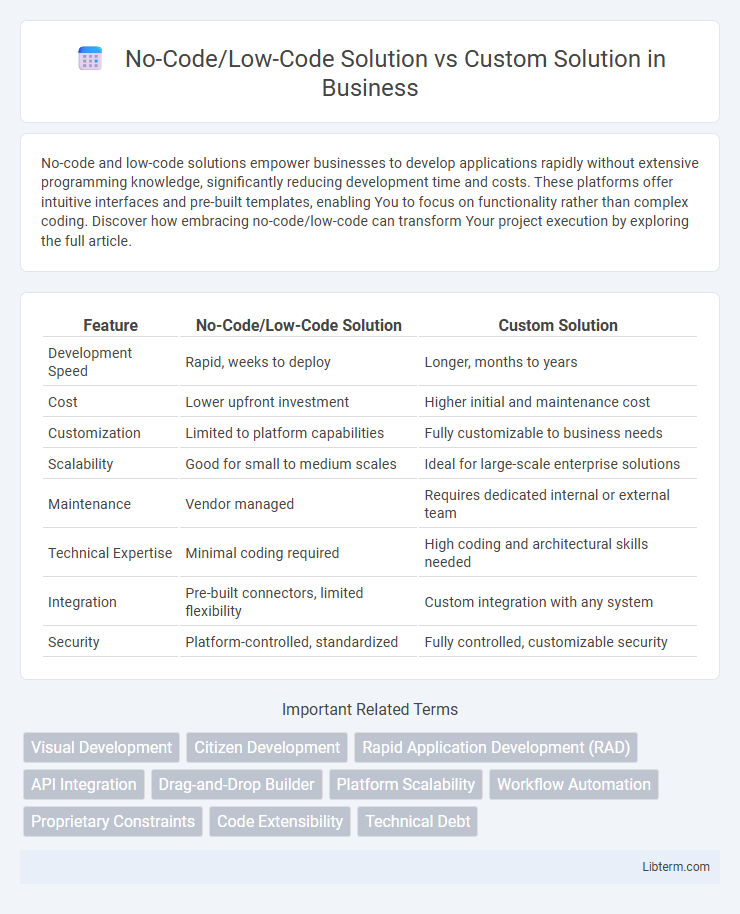No-code and low-code solutions empower businesses to develop applications rapidly without extensive programming knowledge, significantly reducing development time and costs. These platforms offer intuitive interfaces and pre-built templates, enabling You to focus on functionality rather than complex coding. Discover how embracing no-code/low-code can transform Your project execution by exploring the full article.
Table of Comparison
| Feature | No-Code/Low-Code Solution | Custom Solution |
|---|---|---|
| Development Speed | Rapid, weeks to deploy | Longer, months to years |
| Cost | Lower upfront investment | Higher initial and maintenance cost |
| Customization | Limited to platform capabilities | Fully customizable to business needs |
| Scalability | Good for small to medium scales | Ideal for large-scale enterprise solutions |
| Maintenance | Vendor managed | Requires dedicated internal or external team |
| Technical Expertise | Minimal coding required | High coding and architectural skills needed |
| Integration | Pre-built connectors, limited flexibility | Custom integration with any system |
| Security | Platform-controlled, standardized | Fully controlled, customizable security |
Introduction to No-Code/Low-Code vs Custom Solutions
No-Code/Low-Code platforms enable rapid application development through visual interfaces and pre-built components, drastically reducing the need for traditional coding and accelerating time-to-market. Custom solutions involve tailored software development crafted from scratch, providing maximum flexibility and scalability to meet specific business requirements. Choosing between these approaches depends on factors such as project complexity, budget constraints, and long-term maintenance needs.
Core Differences Between No-Code/Low-Code and Custom Development
No-code/low-code solutions prioritize rapid application development using visual interfaces and pre-built components, enabling non-developers to create software with minimal coding, while custom development involves building software from scratch with tailored coding to meet specific requirements. No-code/low-code platforms offer faster deployment and lower upfront costs but may lack the flexibility and scalability of custom solutions, which are designed for complex, unique business needs. Core differences lie in customization depth, development speed, technical expertise requirement, and the ability to maintain full control over application architecture.
Speed and Time-to-Market Comparison
No-code/low-code solutions accelerate development by enabling rapid prototyping and deployment without extensive coding, drastically reducing time-to-market for businesses. Custom solutions require longer development cycles due to tailored coding and testing, offering flexibility at the expense of initial speed. Organizations prioritizing swift market entry often choose no-code/low-code platforms to capitalize on faster iteration and deployment times.
Flexibility and Customization Capabilities
No-code/low-code solutions offer rapid deployment with pre-built components but often lack the flexibility to fully tailor complex workflows or unique business requirements. Custom solutions provide extensive customization capabilities by allowing developers to build highly specific functionalities and integrations, ensuring the software aligns perfectly with organizational processes. While no-code/low-code platforms accelerate development, custom solutions remain the best option for businesses needing unparalleled flexibility and control over their software architecture.
Cost Analysis: No-Code/Low-Code vs Custom Solutions
No-Code/Low-Code solutions typically reduce upfront development costs by enabling faster deployment and minimizing the need for specialized developers, making them ideal for small to mid-sized projects with limited budgets. Custom solutions involve higher initial investments due to extensive coding, longer development cycles, and specialized talent requirements but offer greater scalability and tailored functionality for complex enterprise needs. Total cost of ownership for Custom solutions often exceeds No-Code/Low-Code platforms over time due to ongoing maintenance, updates, and adaptation expenses.
Scalability and Performance Considerations
No-code/low-code solutions provide rapid development but may face scalability limits due to predefined architectures and reduced customization options, potentially impacting performance under high loads. Custom solutions offer greater control over system architecture, enabling tailored optimizations for scalability and high-performance requirements in complex, large-scale applications. For enterprises expecting significant growth or specialized workloads, custom development ensures superior scalability and performance tuning compared to no-code/low-code platforms.
Security and Compliance Factors
No-code/low-code solutions often feature built-in security protocols and compliance frameworks, enabling faster deployment with standardized protections such as data encryption and access controls. Custom solutions allow for tailored security measures aligned precisely with organizational policies and regulatory requirements but require extensive resources for development and ongoing management. Evaluating the trade-offs between rapid implementation and bespoke security customization is crucial for enterprises prioritizing regulatory compliance and data protection.
Maintenance and Support Requirements
No-code/low-code solutions typically require less ongoing maintenance and support due to pre-built components and vendor-managed updates, reducing the burden on internal IT teams. Custom solutions demand more intensive maintenance efforts, including regular code updates, bug fixes, and compatibility adjustments, often necessitating dedicated developer resources. The choice impacts long-term support costs and resource allocation, with no-code/low-code platforms favoring quicker deployment but potential limitations in customization during maintenance phases.
Use Cases: When to Choose No-Code/Low-Code or Custom Solutions
No-code/low-code solutions excel in rapid development for simple to moderately complex applications like internal tools, prototyping, and automations, enabling users without extensive coding skills to deploy quickly. Custom solutions are ideal for highly specialized requirements, complex workflows, and scalability demands where tailored architecture and full control over functionality are critical. Organizations should evaluate project complexity, customization needs, time-to-market, and budget constraints to determine the best fit between no-code/low-code platforms and fully custom development.
Future Trends in Application Development Platforms
No-code/low-code solutions are rapidly gaining traction due to their ability to accelerate development cycles and enable citizen developers, reflecting a shift towards more accessible application development platforms. Custom solutions still hold value for highly specialized or complex applications where tailored functionality and scalability are critical, but they require longer development times and higher costs. Future trends indicate increasing integration of AI-driven development tools within no-code/low-code platforms, enhancing automation and customization capabilities to bridge the gap between ease of use and technical sophistication.
No-Code/Low-Code Solution Infographic

 libterm.com
libterm.com